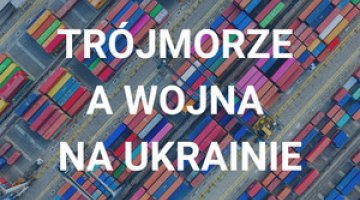Central Europe facing a new wave of migration from the Balkans
According to Frontex, in the first nine months of 2022, the number of attempted illegal crossings of the EU’s external borders in the Western Balkan section increased by 1,500% compared to 2019 and by 170% compared to 2021. The Western Balkans accounted for 47% (or 106,000) of all incidents at the EU borders, but Frontex itself points out that this figure may also represent multiple attempted border crossings by the same people (mainly Syrians, Afghans and Turks). A 118% year-on-year increase – to a total of 29,000 cases – was recorded at the borders of Bulgaria, Greece and Cyprus during the same period. In contrast, according to the Bulgarian Interior Ministry, there were 85,000 attempted illegal crossings on its border with Turkey between January and August – double the number for the entirety of 2021 (41,000). The vast majority of arrivals from this direction are Syrians and Afghans.
The significant influx of migrants via the Balkan route has led to a deterioration of the situation in refugee centres in Germany and increased discussion in Germany about migration policy, including the status of particular groups of arrivals (see: ‘Germany: fears of a wave of refugees over winter’). Problems with places for incoming refugees have also been reported by Austria, with the country hosting 84,000 Ukrainians and also 70,000 refugees from other countries this year – three times as many as in 2021.
Permanent checks on the Czech border with Slovakia have been extended until 28 October. The Czech government introduced checks on 29 September, in response to an increase in the wave of migration along the so-called Balkan route, leading from Turkey, through the Balkans, to Germany and Austria. The Czech Republic has also reinforced its border patrol force (500 police officers and 60 customs officers per shift) with 320 soldiers (80 per shift). From June alone until the day the checks were introduced, 9,500 irregular migrants were apprehended in the country – more than seven times as many as in 2021. In contrast, during the first ten days of regular checks, when 250,000 people were checked, a further 1,900 illegal immigrants (mainly Syrians) and 50 people smugglers (mostly Ukrainians, Czechs and Syrians) were arrested. Although the checks were formally planned to end on 8 October, Prime Minister Petr Fiala had already announced on 26 September that they would remain in force “as long as necessary”. In turn, Interior Minister Vít Rakušan announced on 12 October that the checks had been effective and would “certainly” be maintained after 28 October (which would, however, require the approval of the European Commission). He did, however, provide assurances that they are not planned on the border with Germany. In reaction to the introduction and extension of border checks, Slovakia intensified its requests for a “European solution to the issue”, and the head of the Interior Ministry there, Roman Mikulec, at the EU Council meeting of interior ministers (14 October), called for the strengthening of Schengen border protection. Following the Czech Republic, regular checks on the border with Slovakia were launched and subsequently extended by Austria.
The issue of the influx of migrants into the EU via the Balkan route became the subject of consultations among the countries of the region. On the initiative of Slovakia, the heads of the interior ministries of Austria, the Czech Republic, Slovakia and Hungary met in Bratislava on 3 October, speaking in favour of strengthening the EU’s external borders. On the same day, Hungarian Prime Minister Viktor Orbán, Serbian President Aleksandar Vučić and Austrian Chancellor Karl Nehammer held a meeting in Budapest to discuss the growing migration pressure on the Balkan route.
Commentary
- The current migration wave from the Balkans is significantly higher than in recent years, since the pandemic made it difficult to enter the EU. In the case of Bulgaria, Greece, Serbia and Hungary, the scale of the migrant flow remains much smaller than it was during the 2015 migration crisis. However, the situation in Slovakia and the Czech Republic, due to the diversion of migrant transit routes to these countries by smuggling networks, already resembles that of 2015. In addition, the social systems of EU countries are under heavy strain as a result of the influx of large numbers of refugees from Ukraine, which may raise concerns about their capacity to accommodate more people. The Czech Republic is stressing that it is home to the largest number of Ukrainian refugees per capita in Europe. According to UNHCR data, there are currently 449,000 of them there, equivalent to 4.3% of the country’s population before February 2022, and in Slovakia 98,000, or 1.8% of the population, while in Hungary and Poland this share equates to 0.03% and 3.8%, respectively.
- The governments of countries along the Balkan migration route are trying to shift the responsibility for illegally arriving migrants onto each other. Prague was prompted by pressure from Berlin to take more decisive steps to stem the growing migration flow. Although the Czech Republic tolerated transit migration through its territory, it feared the introduction of checks on the border with Germany, which would – at least temporarily – translate into an increase in the number of irregular migrants in the country, and would also hinder the flow of goods and people. The transit countries of the region have limited capacity to deport migrants and mostly insufficient places in detention centres (Slovakia, for example, has only 300), and stays in lightly guarded facilities not infrequently end with the migrants fleeing to migration destination countries.
- Fears of an internal migration crisis are growing as a result of problems with the implementation of bilateral readmission agreements. Bratislava openly admits that it is not in a position to accept significant numbers of migrants withdrawn from the Czech Republic, as it has its own problems with their readmission to Hungary. Budapest, on the other hand, calls for the strengthening of checks at the Serbian-Macedonian border, which it sees as an important step to stem the flow of migrants from Serbia. The above tensions are also a result of the lack of solution at the EU level. During the pandemic, migratory movements weakened significantly, which translated into a slowdown in work on reforming the common asylum policy and mechanisms to mitigate migration crises. In turn, member states have not yet developed effective mechanisms to deal with the influx of migrants at the national level.
- Actions taken by the Czech government show that it is prepared to damage its very good relations with Slovakia to avoid the introduction of border controls with Germany and accusations from voters of opening the country to uncontrolled migration from outside Europe. The establishment of border checks has caused tensions in Czech-Slovak relations, which are considered “exceptional” by both countries due to their close cultural, political and historical ties. The checks made by the Czechs were strongly criticised by Slovak Prime Minister Eduard Heger, who reproached his neighbours for acting ‘by surprise’ and undermining the Schengen area. This was also echoed by criticism of this step by the Fiala government in the Slovak media.
- The introduction of checks on the Czech-Slovak border effectively shifts the burden of stopping migration from the Western Balkan direction to Slovakia. Bratislava has reinforced patrols on the border with Hungary, but has not decided to launch permanent checks, partly due to staffing problems. In the last six years alone, the total number of police officers (whose remit includes protecting the borders) has fallen by 1,400, and the staff shortage this year is estimated at 2,000. Moreover, the checks could cause tensions in the border regions, which are largely inhabited by the Hungarian minority. Bratislava would also wish to avoid damaging its image in Brussels, which it has been perpetuating for years, of a country committed to European integration (it was, for example, the only V4 country to adopt the euro). It therefore emphasises the need to find a European solution and warns against destabilising the Schengen area.
- In Austria and Germany, there is criticism of Serbia for its liberal visa regime for many third countries, leading to Belgrade airport becoming a hub for migrants. This year has seen an increase in the number of people arriving in the EU via Serbia using visa-free travel. It is the only country in Europe to allow (since 2017) visa-free entry for Indian citizens, who have already submitted 7,600 asylum applications to Austria this year. Serbia’s liberal visa policy towards African (e.g. Tunisia or Burundi) and Asian (e.g. India) countries is an important tool in Belgrade’s efforts to win allies opposing the recognition of Kosovo’s independence in the forums of international organisations. However, the majority of migrants who consider Serbia as a transit country still do not arrive there by air, but via the traditional routes via the Mediterranean Sea and Turkey. In Serbia alone, according to various estimates, there are currently between 6,000 and 10,000 people in asylum centres, mostly arriving from Greece via North Macedonia. Belgrade’s mobilisation to provide shelter for numerous groups of migrants is also the result of pressure from the EU.
- The actions of Turkey have been a crucial catalyst for the increased influx of migrants. In a time of severe economic crisis and social frustration, the topic of Syrian refugees has become a sensitive issue for Turkey’s ruling camp (Justice and Development Party, AKP and Nationalist Movement Party, MHP). Since the outbreak of the Syrian civil war in 2011 Turkey has taken in around 3.7 million Syrian refugees, but public fatigue with the refugee crisis and a rise in nationalist sentiment (around 85% of Turks are demanding the repatriation of Syrians) are becoming increasingly apparent. The issue of the future of refugees is also becoming a prominent theme in the opposition’s campaign ahead of the 2023 parliamentary and presidential elections. It blames the government for not having a clear strategy for their repatriation and using them as a tool of pressure to obtain EU funds (as well as in regional political games), at the expense of Turkish society. Faced with the deteriorating financial situation of refugees and growing anti-refugee sentiment in Turkey, Syrians continue to make desperate attempts to enter the EU (Bulgaria, Cyprus, Greece). In addition, Turkey’s difficult economic situation (hyperinflation and falling real wages) makes officials there increasingly vulnerable to corrupt offers from people smugglers.





